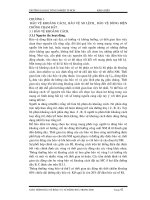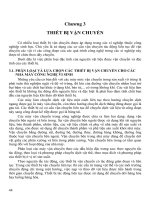Experiment 3 distillation
Bạn đang xem bản rút gọn của tài liệu. Xem và tải ngay bản đầy đủ của tài liệu tại đây (64.7 KB, 2 trang )
CIVL 375 Experiment 3
DISTILLATION
Introduction
Distillation is a process of evaporation followed by condensation. The process is used
both in the environmental engineering and chemical engineering fields. In water
treatment, distillation is one of the desalination processes. Other desalination process
include reverse osmosis and electrodialysis.
Objective
To illustrate the concept of distillation using the distillation unit in the laboratory. This
unit is used to produce deioinzed water from tap water. Through this exercise, the
concept of mass balance should be verified.
Equipment and glassware
Distillation unit
TDS meter
Stop watch
Graduated cylinder
Procedure
1. Run the distillation unit for 15 minutes until steady-state conditions are reached.
2. Measure the flow rate of tap water feeding the distillation unit, the flow rate of
deionized water, and the flow rate of brine discharged into the drain. The flow rate
could be measured by collecting a certain volume from each stream over a certain
period of time.
3. Take samples from the tap water feeding the distillation unit, the produced deionized
water, and the brine discharged into the drain and measure the TDS of these samples.
Make sure the deioinzed water and brine samples are collected to room temperature
before the TDS measurement is done.
4. Repeat step 2 and 3 two more times.
5. Calculate the average flow rate of each stream and the average TDS concentration.
6. Apply the concept of mass balance on flow and TDS concentration to verify your
results.
7. Report the causes of deviation between the theoretical and experimental calculations.
Requirements:
1. Fill out the provided experiment data sheet and carry out the required calculations.
2. If you are requested to submit a report of this experiment then your report should
contain (a) an introduction that ends with the objective (b) methodology including
sample identification (c) results and discussion including sources of errors (d)
conclusion (e) references and (f) an appendix that contains the filled data sheet.
CIVL375: Experiment 3 Data Sheet
Distillation
Name
ID
Experimental Conditions
Experiment date
Sample identification
Results
Flow rate measurement
Run
Tap water
V
(ml)
t
(min)
Deionized water
Q
(ml/min)
V
(ml)
t
(min)
Q
(ml/min)
Brine
V
(ml)
t
(min)
Q
(ml/min)
1
2
3
TDS measurement
Run
Tap water
(mg/l)
1
2
3
Deionized water
(mg/l)
Brine
(mg/l)
Required Calculations
1. Determine the average flow rate of each stream and apply the concept of mass
balance on flow rates
2. Determine the average TDS of each stream and apply the concept of mass balance
on TDS.









